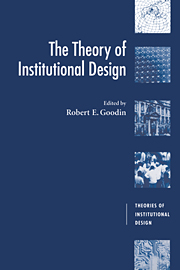Book contents
- Frontmatter
- Contents
- Notes on Contributors
- Preface
- 1 Institutions and Their Design
- 2 Institutional Design and Rational Choice
- 3 Second Best Theories and the Implications for Institutional Design
- 4 The Informal Logic of Institutional Design
- 5 Institutional Morality
- 6 The Publicity Principle
- 7 Designing Institutions in East European Transitions
- 8 Political Deals in Institutional Settings
- 9 Self-inventing Institutions: Institutional Design and the U.K. Welfare State
- 10 Selection and the Currency of Reward
- Name Index
- Subject Index
5 - Institutional Morality
Published online by Cambridge University Press: 05 August 2012
- Frontmatter
- Contents
- Notes on Contributors
- Preface
- 1 Institutions and Their Design
- 2 Institutional Design and Rational Choice
- 3 Second Best Theories and the Implications for Institutional Design
- 4 The Informal Logic of Institutional Design
- 5 Institutional Morality
- 6 The Publicity Principle
- 7 Designing Institutions in East European Transitions
- 8 Political Deals in Institutional Settings
- 9 Self-inventing Institutions: Institutional Design and the U.K. Welfare State
- 10 Selection and the Currency of Reward
- Name Index
- Subject Index
Summary
Introduction
A central problem in the design of institutions is the assignment of responsibility. Almost all moral theories are about the morality of individuals, not of supra individual entities such as organizations or societies. Hence, in those theories, an account of institutional responsibility must be subject to unpacking down to the level of individuals. This raises questions of composition: Who is how much responsible for which part of what? It is these compositional problems that are the focus of discussion here.
In general, we may say of an institution as a whole that its morality is reasonably well defined by its purpose and its likely effects. In this sense, an institution's morality is inherently consequentialist. It might not be utilitarian, however, because its purpose could be the support of equality, justice, or autonomy, and not necessarily the support of welfare. Once the institution's morality is defined, we may infer or deduce the morality of individual office holders in the institution as derivative from the purpose of the institution. Or; we may say, the rules and procedures that guide the actions of individual officeholders are determined by the functional relation of their actions to the general purposes of the institution (Rawls 1955; Hardin 1988, pp. 100–5). Institutional morality is structurally similar to some variants of virtue theory: Its content is functionally determined by the purpose it is to serve. And it is analogous to the problem of legal justification. We may first seek justification of the law and then justification in the law.
- Type
- Chapter
- Information
- The Theory of Institutional Design , pp. 126 - 153Publisher: Cambridge University PressPrint publication year: 1996
- 7
- Cited by

